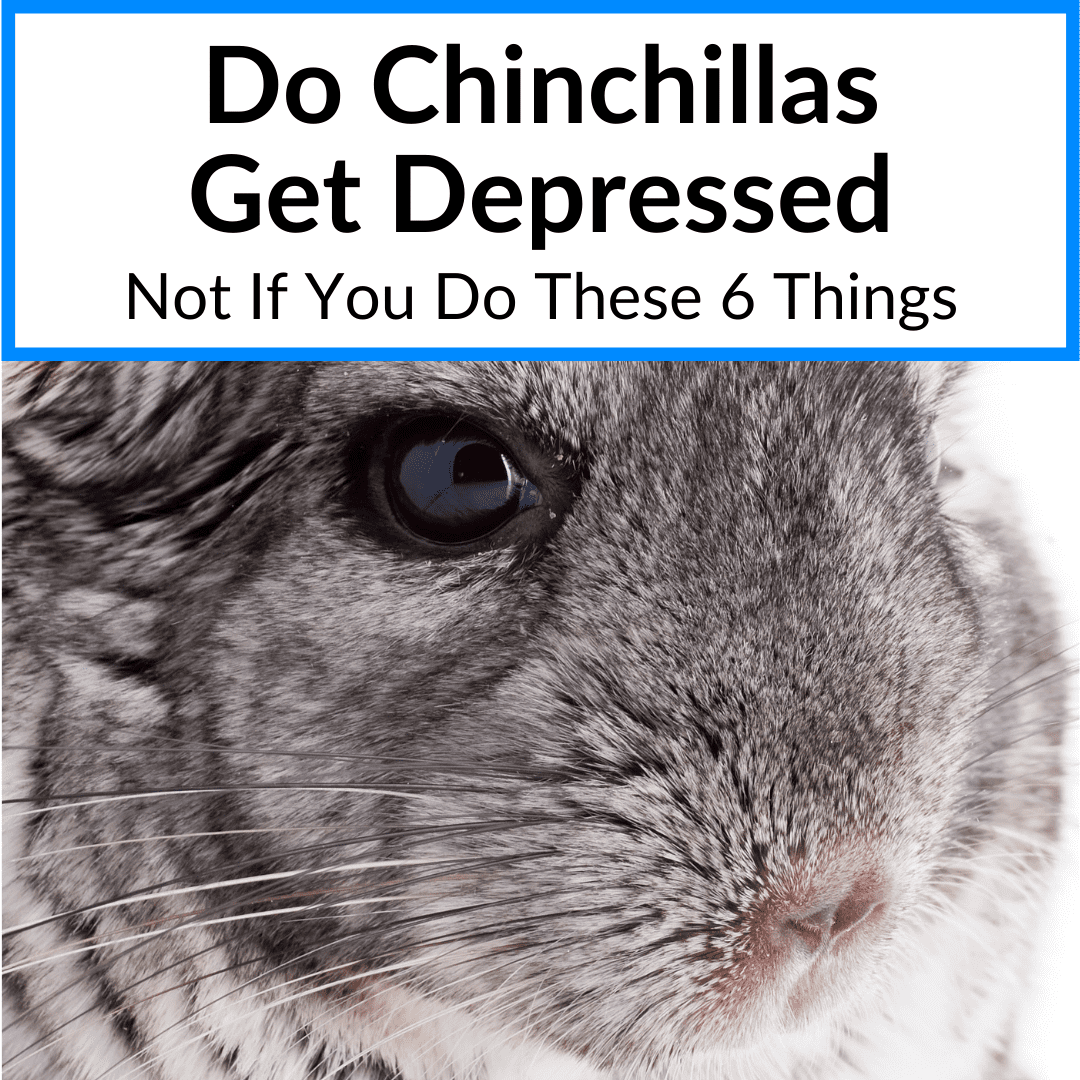
But not all of them. And not all of the time.
Sometimes your chinchilla might seem a bit lethargic and withdrawn.
It can honestly seem exactly like they are feeling depressed.
But is that even possible. As rodents, do chinchillas get depressed at all?
Well, it turns out they actually feel a number of emotions.
Keep reading to learn if depression is one of those emotions and what you need to do to keep ytour chin happy and healthy. The good news is: it doesn’t take much.
Contents
Do Chinchillas Get Depressed?
Yes, chinchillas can get depressed. These cute little rodents need love and affection. Without love, affection, and social interaction, a chinchilla can get depressed and act more lethargic.
To avoid your chinchilla becoming, spend some time interacting with it every day, especially if you only have one chin.
Don’t worry, everyone.
Most of us don’t purchase a chinchilla just to lock it away in a dungeon.
At least I hope none of us would do that!
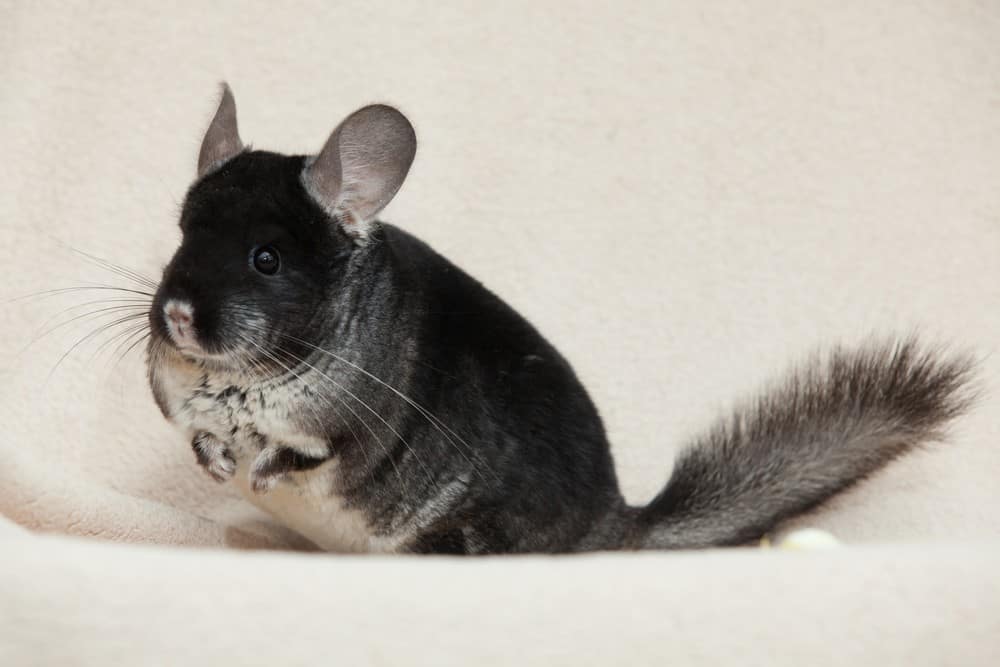
We obviously want to spend time with our pets, whenever we can. And that simple act is one of the first keys to keeping your chinchilla from ever becoming depressed.
The rest of this post will cover other tactics and recommendations you can implement to avoid a depressed chinchilla in your own household.
Why Chinchillas Get Depressed
Chinchillas can become depressed for a variety of reasons. It all depends on what was taking place in their environment prior to the onset of being a bit less social.
Most chinchillas will show more signs of anti-social, quiet, and even lethargic behavior purely because they aren’t getting the care they need or deserve.
Chinchillas are intelligent rodents with a high IQ.
They can realize relatively quickly when something is missing from their daily routine.
Here are a few examples of ownership issues that could lead to these depression type problems.
- Unclean cage or lack of cage cleanings
- Lack of time out of the cage with you
- A sudden shift in the environment such as moving to a new location
- Removal from a prior bonded cage mate (another chinchilla)
Not being with another cage mate honestly isn’t the end of the world, if you keep a diligent schedule with the other items on the list above.
How To Tell If Your Chinchilla Is Depressed
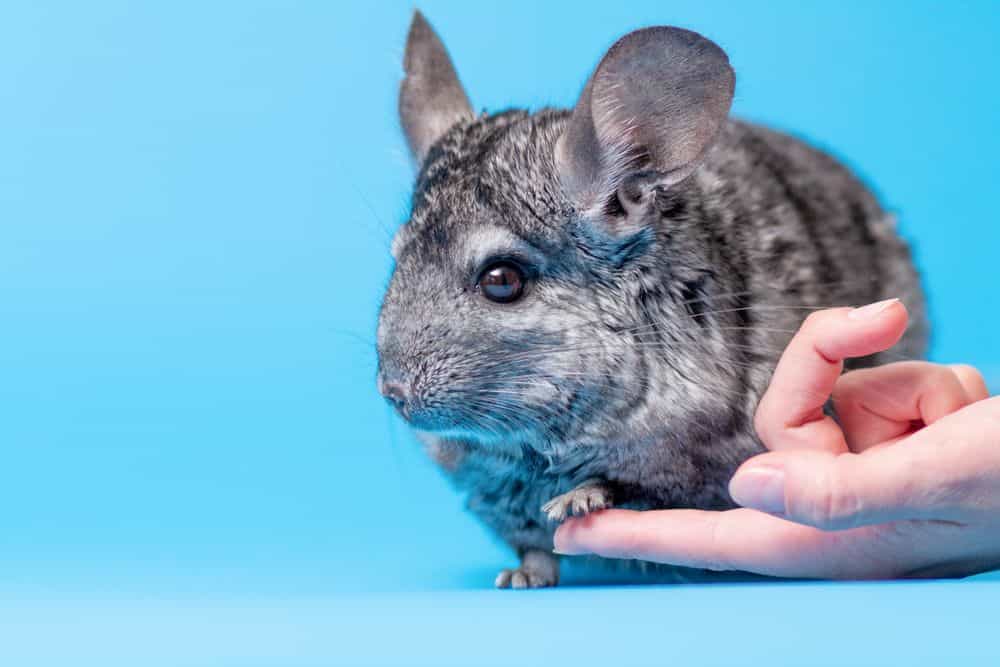
If you are sitting around wondering if your chinchilla is depressed, you may be feeling some anxiety about how you can recognize depression in a chinchilla .
I get that. Sometimes it is hard to understand all of your chinchilla’s body language and what it is trying to communicate.
Some days it will be making sounds and communicating and on others, it seems that it isn’t quite in the mood.
The best advice I can give you is to try and spend more time with your chinchilla. Learn how to get it in and out of the cage properly.
Learn how to hold your chinchilla properly.
The more time you can get it out to interact with it and play with it, the more you are going to learn about it and the easier it is going to become to understand when your chinchilla is not happy or going through something physically or emotionally.
With most chinchillas, after you have spent enough time around it, it will become much easier to recognize if it is depressed or sad.
If your pet is beginning to act more lethargic or even more timid than usual, maybe it does not feel comfortable or safe or is becoming less social, sad and depressed.
However, the only way you would be able to recognize these signs of depression is if you know your chinchilla’s personality inside and out.
Recognizing and understanding if your chinchilla is depressed is the first step towards fixing the issue, which is what I want to cover next.
Preventing Chinchilla Depression
The good news is that preventing depression in your chinchilla is not hard. Do the following 5 things and chances are your pet will never feel too down again.
Spend Time With Your Chinchilla
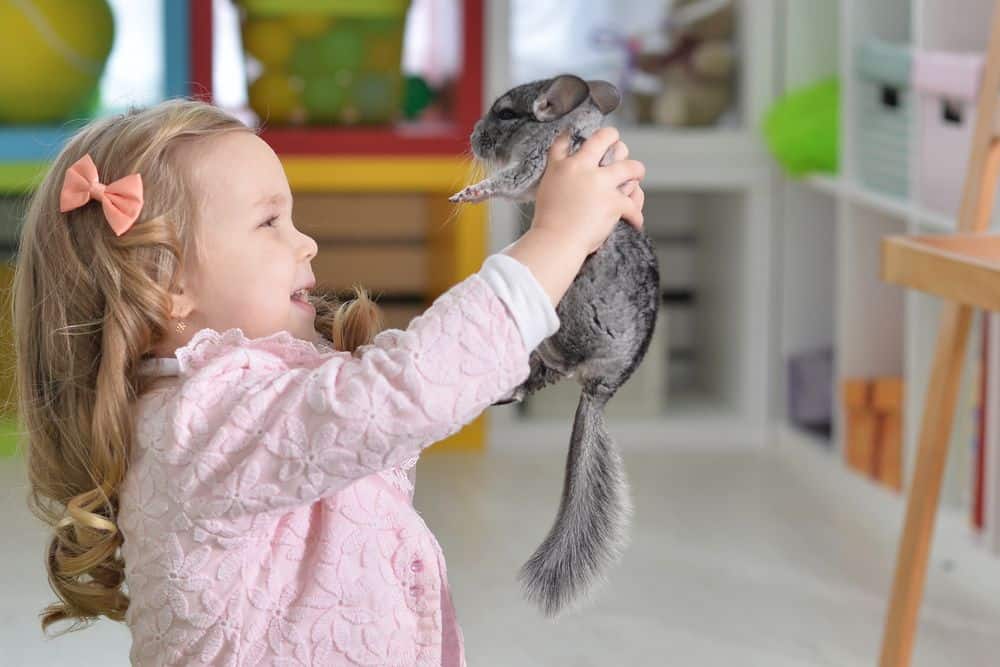
Being social with your chinchilla is a huge factor in keeping it happy and something you always need to keep up with.
Learning how to socialize your chinchilla properly is also imperative when you first arrive home after the adoption.
Chinchillas isolated in the home without a cage mate can quickly feel a bit down. You should always try to spend at least some time with your chinchilla every day.
Preferably out of the cage, if you have a safe area that permits this. If you don’t, create a safe area by completing the chinchilla proofing process.
You can also use one of my top recommended products that I rave about in tons of my blog posts: the pop-up animal play tent.
This solves the problem of not having a chinchilla proofed room and allows you to interact closely with your chinchilla.
Chinchillas are affectionate and using a playpen like this can build the bond and friendship with your chinchilla relatively quickly.
At least that’s how it worked for me.
Make your chinchilla feel like part of the family.
It’s crucial and will help avoid any depression issues now and in the future. Read this list of 9 things you can do with a chinchilla for some additional ideas.
Use A Proper Sized Cage
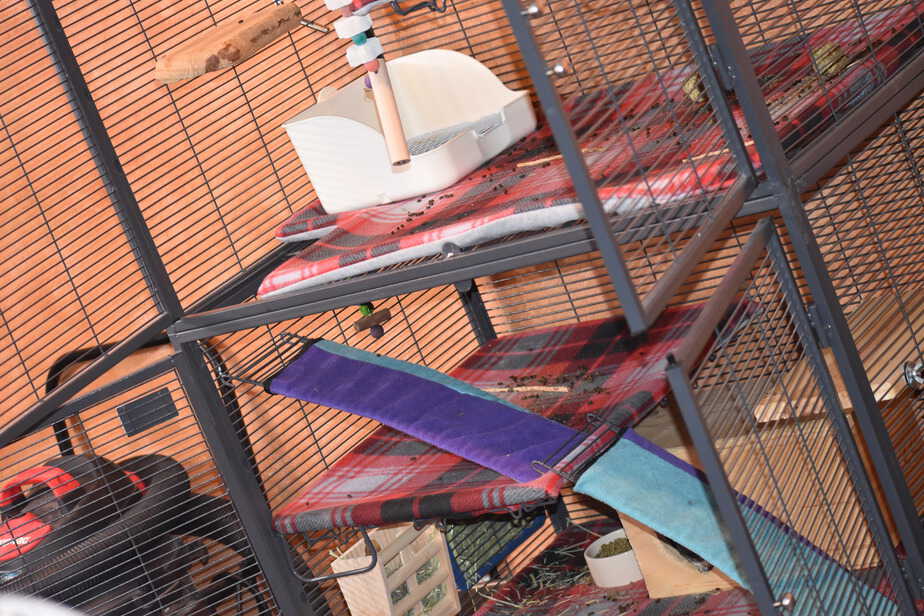
Not everyone has the time to spend hours per day with their chinchilla out of the cage. Heck, I barely do, and I work from home.
That’s okay.
However, you do at least need to make sure that your chinchilla has a stimulating cage environment. This means a large enough cage.
I’m a huge fan of the Critter Nation dual-level cage from Midwest Homes for Pets. It’s one of the largest cages you can purchase for a budget-friendly price.
However, your work doesn’t end here.
Give Your Chinchilla Plenty Of Fun Toys
Chinchillas need activities and stimulation inside of the cage. I have a post that details the best chinchilla toys here.
Additionally, check out my post about the most necessary chinchilla cage accessories.
These items allow your chinchilla to run around and jump from ledge to ledge.
Picture it like this.
Even if you spend a full hour per day with your chinchilla out of the cage, that still leaves 23 hours a day where it has nothing to do except mull around inside of the walls of the cage.
Make it interesting for your little pet. Make sure you have tunnels, wheels, and bridges.
Use one of the best hammocks to give it a second spot to rest and sleep.
Little things like this that you can do for very little money make a significant difference in keeping your chinchilla happy, healthy, and stimulated.
Consider A Second Chinchilla
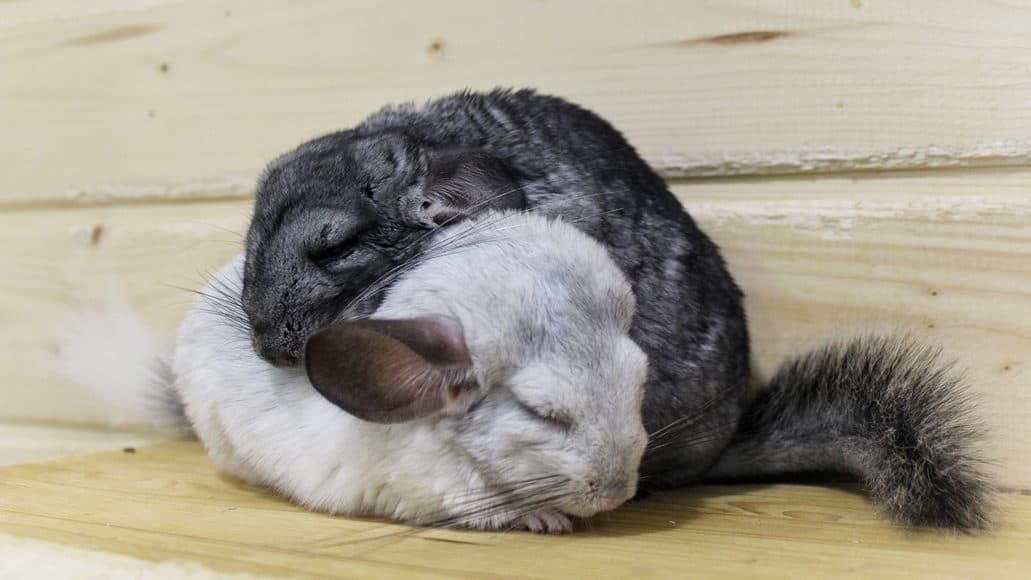
Now, let’s assume you spend time with your chinchilla and meet all the recommended criteria we have discussed this far.
Maybe you still feel like your chinchilla is somewhat down in the dumps.
Perhaps you’re right. If you also have a friendly and social chinchilla on your hands, don’t hesitate and consider adopting a second chinchilla.
It may be exactly what both the chinchillas need to thrive and remain happy. No matter what, chinchillas always want to be social in some manner.
In the wild, chinchillas are used to running in herds.
If you adopted your chinchilla from a local breeder, chances are it was around other chinchillas for at least some duration of time.
So if you feel like you are doing a great job and your chinchilla doesn’t seem to be a glowing ball of sunshine, consider adding a cage mate to help it snap out of it.
Chinchillas are relatively cheap to own, and if this is all that’s needed for your chinchilla to remain happy over the next 15-20 years, it surely seems like a small price to pay, in my opinion.
Keep Your Chinchilla Clean And Healthy
These two items don’t necessarily lead to depression immediately. But they can over the long run.
Think of yourself, for instance.
Do you want to be kept from healthy food or food in general?
How about a shower?
Surely, as time passes, if you neglect these two items, your chinchilla may feel neglected or depressed.
Chinchillas absolutely love to take their dust baths, so be sure you are providing this at least 1-2 times per week, but preferably 3 times.
As far as food, don’t overload on treats and stick to chinchilla safe diets like timothy hay, and pellets.
If your chinchilla doesn’t get the nutrition and hygienic care it needs, it can lead to health and mental concerns.
Stay on top of these things, and you won’t have anything to worry about.
Pay Attention
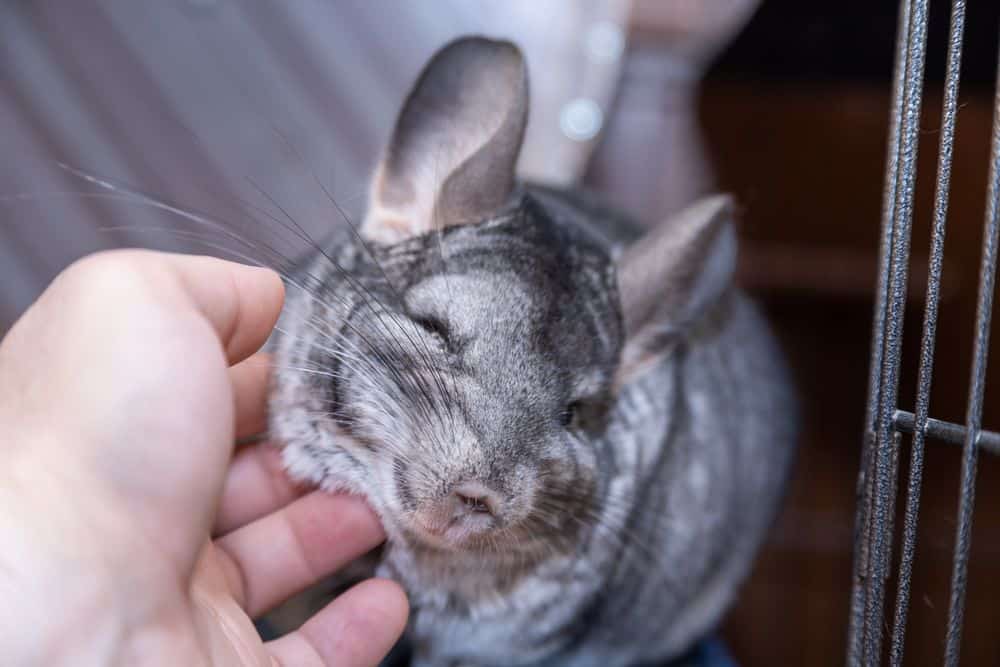
The last significant piece of advice I can give you to avoid depression and other social issues in your chin is to pay attention.
Don’t neglect your chinchilla.
Perhaps it’s nothing at all related to depression, and it is sick and needs medical attention from a vet.
You will never know if you aren’t paying attention, so be sure to tabs on what’s going on with your chinchilla daily.
Chinchilla Depression: Final Thoughts
Chinchillas are wonderful pets to own in just about every way, but it is possible for a chinchilla to get depressed.
And it is important that you can recognize and understand when your chinchilla is depressed or sad.
This is going to help strengthen the bond for years to come.
Overall, if you keep up with your end of the deal, depression with chinchillas is something you likely won’t encounter.
However, if you are having issues now as you read this post, perhaps try implementing some of the tips and tricks I’ve laid out for you today, to pull your pet out of it and get it happy, healthy, and active again.
I wish you the best of luck with your chinchilla!
Now it’s your turn!
What’s your experience with chinchilla depression?
What have I left out of this post?
What else can you add that can help other readers deal with chinchilla depression?
Be sure to share your thoughts, stories, and concerns by dropping a comment below.
As always, Chili and I appreciate you stopping by. Thanks again, and we will see you next time.
Leave a Reply